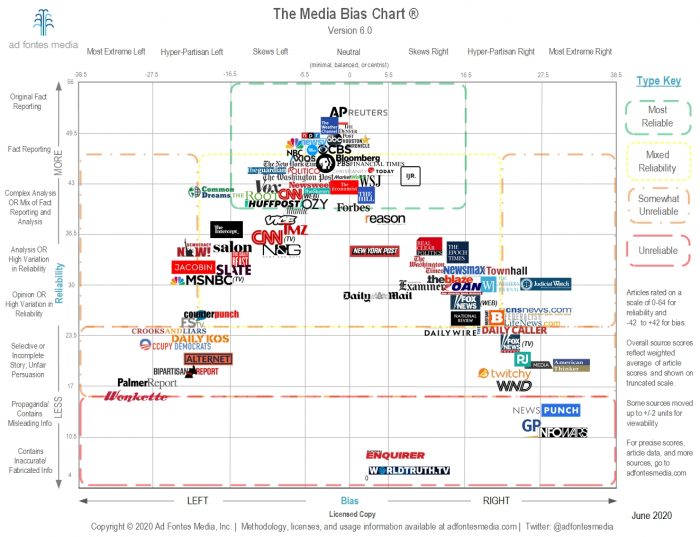
How to Influence the “Liberal Media”
A Gallup Poll revealed in September 2019 that Americans’ trust in the media had hit a new low. Only 41 percent of us feel like we can trust mass media to report the news fully, accurately, and fairly.
Ad Fontes Media regularly assesses and rates the news for bias and reliability with a rigorous methodology used by a politically balanced team of analysts. Here’s their monthly chart for June 2020.

Aren’t you happy to see that the Weather Channel is considered neutral? 😉
As a journalist (which means I’m a member of the media), I often grit my teeth over many conservative Christians’ responses to the media—especially believers who watch only one cable news station and read only evangelical newspapers. Because these believers agree with the perspectives presented, they don’t notice bias. So sadly, in the words of Lifeway researcher Ed Stetzer, “Too often, Christians are in a state of perpetual grievance, where each passing day brings another new controversy about which we must act or else Christianity in America will crumble.”
Most of us want to be part of a positive force for change. And complaining about how “liberal” the media is fails to accomplish that goal. We can see from the chart that there’s plenty of bias on both sides. And Jesus is the truth. So how can we improve our honesty, our witness, and our influence? First, we need to understand some essentials:
· Remember that all media is not liberal. Because of Pulitzer-prize-winning investigative reporting by the Boston Globe’s Spotlight Team, victims of sex scandals in the Roman Catholic Church were finally heard; because of the Houston Chronicle’s relentless pursuit of justice, 700 sex abuse victims in the SBC who suffered over a period of 20 years finally received some attention; The Washington Post exposed the Watergate scandal; Julie Lyons, former editor of Dallas Observer and wife of an evangelical seminary grad, has solved crimes through her investigative reporting; The Indianapolis Star and their coverage of the Larry Nasser case helped Rachel Denhollander and more than 250 victims to be heard; solid journalism looking into racism in the court cases of Curtis Flowers (he was tried six times) finally freed him this week after nearly 24 years behind bars for a violent crime the evidence says he did not commit. Thank God for the media! And please avoid saying “the liberal media” when you mean “the media in general.” Speaking disparagingly about all media is slanderous.
Understand the difference between “news” and “editorial.” Straight news reporting is supposed to be neutral. It includes stories such as “Syria rebels will skip talks unless they get arms,” and “The United States has fared worse in job gains than six of the nine countries surveyed by a federal agency.” Such reports are neither “conservative” nor “liberal.” Editorial reports, on the other hand, are openly laced with opinion and usually marked as “editorial” to distinguish them from hard news. Consider the editorials in the New York Times that have lambasted both the Obama and Trump administrations. Editorials in print might include lampooning cartoons. In print or television, they include outright opinion pieces, including interviews with people who state opinions. Often complaints about bias come from people viewing or reading editorials and thinking, “This is supposed to be news. Why does it include this liberal opinion?” Additionally, ads for political candidates often appear on straight news pages, even if such ads don’t represent a publication’s views.
Once we understand these things, we need to know what others are actually saying…
· Open your news feeds to include a broader perspective. When the New York Times editorial board said “President Obama has lost all credibility because of government snooping on emails and phone records,” few conservative evangelicals applauded the generally liberal-leaning paper for trying to provide balanced editorial coverage. I wonder if most even knew. Most white evangelicals lean right politically, and in our fractured country, more and more readers are choosing to read/listen only to sources that affirm our own biases. The Wisdom literature of the Bible provides a good course correction:
“There are two sides to every story.
The first one to speak sounds true until you hear the other side
and they set the record straight.” —Proverbs 18:17
But realize that a reporter can’t always find someone to speak for both sides. Journalists usually pride themselves in getting complete coverage. Most want such evenness even more than they want to advance their own ideas. A reputation for unbiased reporting is still more vocationally prestigious than being considered someone on the “right” or “left” in one’s reporting. But sometimes reporters can’t find people on both sides. When I was in Jordan four days after Barak Obama was elected president, I tried to find a Jordanian Christian who disliked the results (everyone I met was thrilled). I asked and asked, but I could not find one. The absence of such a perspective slanted my reporting, but that doesn’t mean I intentionally left anyone out.
So how can we interact to influence media?
· Help to create the right demand. We create demand by clicking on hyperlinks. LET ME SAY THAT AGAIN: We influence the news by clicking on hyperlinks. If we consistently demand news about the Duke and Duchess of Sussex or the Kardashians, but we don’t click or comment on stories about the after-effects of COVID-19 or a white-collar-crime case or a church getting bulldozed in Southeast Asia, guess which branch of the news will get staffed with the most and best reporters—and supported with advertising dollars? This also means we need to affirm what is true, even when it comes from sources we dislike—maybe even especially when it comes from “opposing” sources.
· Teach through leaving insightful, well-informed comments. We also create demand by leaving comments about stories that matter most to us. People write inflammatory comments on just about every news story. Believers can counter arguments by being the reasonable ones in the conversation. But we have to show up. If we want to influence those with whom we disagree, we need to appear in places they read and help them think about different angles on the stories. Rather than retreating only to our own news ghettos, where we shield ourselves from hearing opposing opinions, we need to help unbelievers see the winsomeness of a biblical perspective where they live. I consider this a hugely neglected mission field. The most credible responses are devoid of modifiers (“crazy,” “unbelievable,” “insane,” “demonic,” as well as Christianese), and simply state the balancing idea and/or the facts. Here’s what an editor at the NYT said about this: “On most days, conservatives occupy just a few back-row seats in this giant liberal echo chamber, not because [people on the right] are screened out by editors but because they don’t show up in the first place. Bassey Etim, who oversees the comments forum, makes a point of salting conservative voices into the week’s list of top commenters.”
· Consider a career in journalism, or helping to finance Christian journalism students. The top-three newspapers in the US, based on circulation numbers, are USA Today (leans left); The Wall Street Journal (leans right); and The New York Times (leans left). We need more good journalists writing for all of these publications. I find I most often quote the New York Times, because they have higher standards than many for verifying news and vetting hard-news sources. That matters to me, as it should every Christian. My student Kaitlyn Scheiss published this beautiful, Christ-honoring piece on the fallout at her alma mater, Liberty University, recently in the New York Times. We need more students like her submitting well written articles. And that means funding scholarships….
· Affirm what you appreciate. Few people send editors positive mail. (Trust me, I know this from experience.) When a reporter does a good job, thank him or her–and the next person up in the food chain. It will motivate the media to provide more of the same. When the New York Times Book Review features a book such as this one by Christ-follower Chimamanda Ngozi Adichi, send an affirming message to the editor. A reporter ran an article about my brother-in-law being killed by a texting driver while biking uphill, and this journalist included quotes about Gordon’s faith that made the front page of The Oregonian. That “liberal” paper ran a pull-quote about the Lord Jesus Christ on page one. Consequently, the reporter received thank-you’s from our family, with specific appreciation expressed for leaving in the parts about Gordon’s faith. If you want to see journalists treat Christians and Christianity with more respect, treat them with respect. Speak about them with respect. And send mail that reinforces those who do so.
· Get the facts, and refuse to exaggerate. If a story seems sensational, wildly opposing your worldview or suggesting that US Christians are being massively persecuted, suspect that it’s exaggerated. Many Christians passed along a story that said the U.S. Army was blocking evangelical websites due to theological or cultural differences. That news was later debunked. Then there was the one about how the military was going to arrest soldiers for sharing their faith? In response, a Department of Defense spokesman insisted that members of the military are indeed free to share their faith as long as they don’t harass others. Stetzer lamented, “So many Christians were quick to believe a false report. Again.” Refuse to be that person.
· Speak up when our own are out of line. At an Evangelical Press Association national conference held at Focus on the Family headquarters several years back, a panel of local Colorado Springs journalists included a number of non-Christians. One, an openly gay man, promised that if Christians would stop their own from speaking violence against gays, he would commit to stopping the gay community from similarly threatening Christians. Ow! How sad that he should even have to say that. Also, when one of our own says something like “those killed in 9-11 were experiencing God’s judgment,” we need such an outpouring of Christians objecting that the “liberal media” does not even have to criticize—because so many Christ-followers are pointing people to Luke 13:4 . If a famous politician claiming to align with Christianity makes a false statement, are we more committed to his politics than to the truth? If so, why do we think God has left us on earth? How is that salt and light? Think of the prophet Nathan and how he supported King David by telling him the truth to the glory of God (see 2 Sam. 12).
· Pray. Ever heard anyone in church humbly pray for journalists or speak of them in compassionate terms? Me neither. Do we really believe Jesus died even for writers in the “liberal media” and their readers? Could he possibly change their hearts? And use us to do it?




